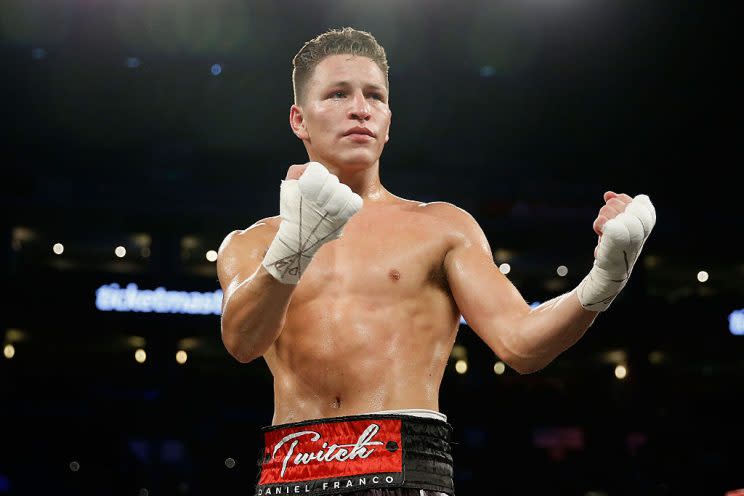Daniel Franco in medically induced coma after knockout loss on Saturday

Probably a dozen times over a few-hour span, the telephone rang. Every call was eerily similar.
“Did you hear what happened to Daniel Franco,” the callers asked.
But beyond that, there was little discussion of Franco’s featherweight bout Saturday in Iowa with Jose Haro. No, the discussion almost immediately turned to Franco’s kind and friendly demeanor, his charitable work, his affable ways.
Franco, 25, suffered two bleeds on the brain after being knocked out by Haro in the eighth round of a bout at the WinnaVegas Casino in Sloan, Iowa. Per his father, Al, Franco was bleeding from two veins in his brain. He underwent emergency surgery and is in a medically induced coma.
The next 72 hours will be critical, though signs are promising.
“He’s truly a remarkable young man,” said Bernie Bahrmasel, who has served as Franco’s publicist for the last two years. “He comes from a wonderful family and he’s really just a great kid.”
Over and over, that theme was repeated, from those who work with him and those who simply know Franco and his family. Al Franco operates the WarZone Gym in Rancho Cucamonga, California, and boxing is a family affair.
Franco, who began his career 15-0-3 before dropping two of his last three, didn’t seem to take any unnecessary punishment. It’s not like referee Celestine Ruiz let the fight go on too long. Franco was dropped earlier in the eighth round, then was knocked out by a big shot that sent him down face first.
Most of the time, after being checked by doctors, the fighter gets up, embraces his opponent and goes on with his life. But every fighter knows when he slips between the ropes what could potentially happen.
It’s a risk that every boxer takes, which is why it is important that everyone remotely connected with boxing understands one fact clearly: There is no such thing as an early stoppage in boxing.
The referee is in the ring to protect the fighters. If he or she has an inclination that a fighter has had enough, it’s time to stop the fight, and everyone needs to accept that. No fight, no victory, is worth that risk.
The problem with boxing is that impending brain injuries aren’t always apparent. I’ve seen fighters walk from the ring under their own power, blowing kisses to the cheering crowd, only to collapse in the locker room.
Fighters aren’t allowed to compete until they pass their pre-fight medical examinations, which are vastly more thorough than they were even 10 or 12 years ago.
But many times, they develop issues during sparring sessions, which aren’t regulated by a referee with a trained eye. While it’s impossible to know if this is what happened to Franco, so-called “gym wars” are insidious.
If a boxer takes too much punishment in the fight, the relevant athletic commission simply gives him or her a medical suspension that prevents the boxer from having contact for as long as doctors feel is necessary.
But if he takes too much punishment in the gym, far too often, he’s back the next day. The unseen injury doesn’t have time to heal, and the consequences can be fatal.
The vexing part is that these brain injuries don’t follow a pattern. It happens to some fighters, but not others. Despite voluminous research, we’re no closer today than we were a quarter of a century ago to finding out how to prevent these types of tragedies.
The only way with 100 percent certainty to prevent traumatic brain injury is to not fight.
But there are literally thousands of stories about how boxing has saved some potentially wayward young man and helped turn him into a successful, contributing member of society.
Even a sport league as rich and powerful as the NFL is almost helpless when it comes to fighting brain injuries. Chronic traumatic encephalopathy (CTE) has sadly become part of the football fan’s lexicon. Some of the game’s greatest stars, such as the late Junior Seau, have developed it and it has led to tragic results.
Franco still has a chance to not become another sad statistic. There is a chance that he recovers and can go on to live a normal life.
There is a chance, though, that at some point, our worst fears will be realized.
That something like that could happen to a prince of a young man like Franco makes this story all the more horrific.
This should be a week of celebration for boxing fans. It’s had a brilliant first half of the year, and it closes with a terrific rematch Saturday in Las Vegas on HBO Pay-Per-View between Andre Ward and Sergey Kovalev.
It’s hard, though, to be in a celebratory mood when a good-looking, personable 25-year-old is laying in an Iowa hospital bed in a fight for his life.
There’s not much to do right now but hope and pray.
That, and remember that the next time the referee jumps in to stop a bout, he may have just saved someone’s life.
Click here for the GoFundMe page to help Daniel Franco’s family with medical expenses.
More from Yahoo Sports:
• Mighty Pens! Penguins are Stanley Cup champs again
• Three things to watch: Warriors don’t want Game 6
• Ex-NBA player arrested on gun, marijuana charges
• Instagram model tweets Steelers star’s phone number


